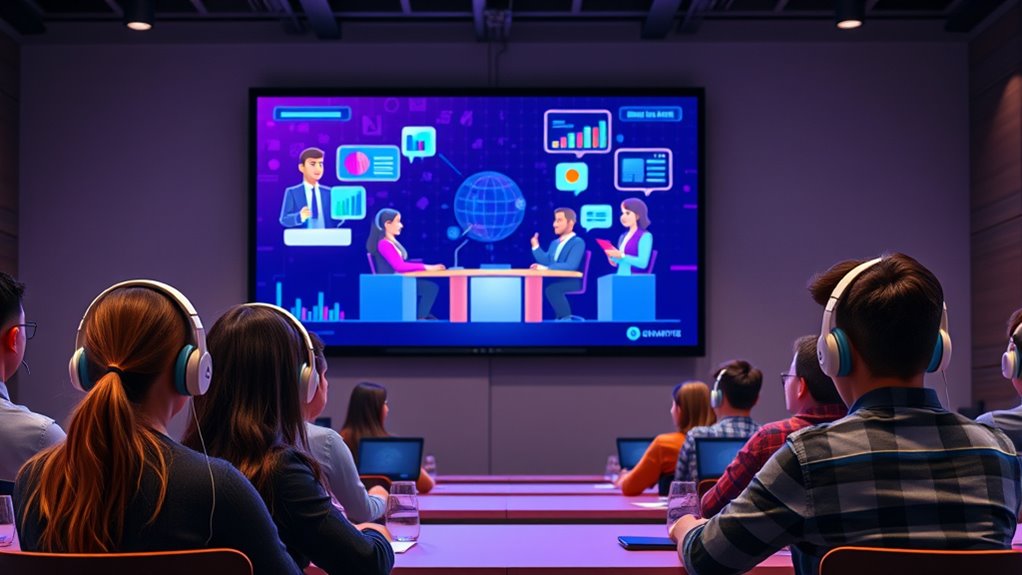AI in virtual debate platforms helps you improve your speaking and critical thinking skills by providing real-time feedback on your delivery, tone, and clarity. It can generate diverse arguments and counterarguments to expand your perspectives and personalize your practice sessions to suit your strengths and weaknesses. Advanced features like immersive virtual reality and automated moderation make debates more engaging and fair. To learn how AI can revolutionize school debates, discover more below.
Key Takeaways
- AI analyzes speech to provide immediate feedback on delivery, tone, and clarity, improving students’ debating skills.
- Virtual debate platforms use AI to generate diverse arguments and counterarguments, enriching critical thinking.
- AI-powered tools personalize debate experiences, focusing on individual strengths and offering tailored skill improvement suggestions.
- Integration of VR and advanced NLP enhances immersive, interactive, and realistic debate scenarios for students.
- Challenges include resource limitations, ethical concerns, and the need for teacher training to effectively implement AI tools.

Artificial Intelligence is transforming educational experiences, and virtual debate platforms are no exception. As a student, you might notice how AI can make debates more engaging and personalized. AI tools can analyze speech patterns, giving you immediate feedback on your delivery, tone, and clarity. This helps you improve your speaking skills more efficiently than traditional methods. Additionally, AI can assist in generating arguments and counterarguments, providing you with diverse perspectives that enrich your debating experience. This support ensures you’re better prepared to handle various topics and respond quickly to opponents.
AI personalizes debates, offers instant feedback, and helps you develop stronger speaking and critical thinking skills.
As you participate in virtual debates, AI can help tailor the experience to your individual needs. It can identify your strengths and weaknesses, offering customized suggestions on how to improve. For example, if your argument lacks clarity, AI can highlight specific parts of your speech that need work. This personalized feedback makes your practice sessions more effective and helps build your confidence over time. Many debate platforms are starting to incorporate these AI features, creating a more interactive and supportive environment for learners of all levels. Furthermore, integrating educational technology can enhance the overall learning process, making it more engaging and effective. The integration of remote collaboration tools can also facilitate team-based debates across different locations, increasing the scope of participation. In addition, ongoing research into AI ethics emphasizes the importance of responsible AI use in educational settings to ensure fairness and transparency. Moreover, advancements in natural language processing enable AI to better understand and evaluate complex arguments, improving the quality of feedback provided to students.
Furthermore, AI integration can increase engagement by making debates more dynamic. Platforms equipped with AI can facilitate real-time moderation, ensuring rules are followed and maintaining a fair environment. They can also suggest debate topics based on your interests or current events, keeping the experience fresh and relevant. Some platforms even incorporate virtual reality, immersing you in lifelike debate scenarios that simulate real-world situations, which can enhance your critical thinking and public speaking skills.
However, implementing AI in virtual debate platforms isn’t without challenges. Technical difficulties can arise when integrating AI tools into existing platforms, and not all schools have the resources to support such advanced technology. Ethical concerns also exist, such as the potential for AI to be used for cheating or to reduce meaningful interactions between students and teachers. Additionally, disparities in access to AI resources can deepen the digital divide, leaving some students at a disadvantage. Teachers may require training to effectively utilize these tools, and the costs involved can be prohibitive for underfunded schools.
A new challenge is ensuring the accuracy of AI analysis, so students receive reliable and constructive feedback that truly enhances their skills. Despite these hurdles, AI holds significant promise for making virtual debates more interactive, personalized, and accessible. By providing instant feedback, generating diverse arguments, and creating immersive experiences, AI can elevate the quality of debates and develop essential skills like critical thinking, communication, and adaptability. As technology continues to evolve, the potential for AI to transform virtual debate platforms and, by extension, educational outcomes, remains vast and exciting.
Frequently Asked Questions
How Does AI Ensure Fairness in Virtual Debates?
You want to know how AI guarantees fairness in debates. It does this by analyzing speech patterns, content, and delivery objectively, removing human biases. AI provides transparent and consistent evaluations, so everyone’s judged by the same standards. Plus, it offers real-time feedback, helping you improve your arguments instantly. By cross-referencing facts and evaluating argument quality, AI promotes impartiality and fairness, making sure all participants are evaluated equally.
Can AI Adapt to Different Debate Topics Dynamically?
They say “the proof is in the pudding,” and with AI, adaptability is key. You’ll find that AI can dynamically adjust to different debate topics by using advanced techniques like NLP, LLMs, and real-time strategy updates. It analyzes new arguments, shifts strategies, and generates relevant responses instantly. This means your debates stay engaging, relevant, and challenging, no matter how unexpected the topic, making AI a flexible and powerful debating partner.
What Are the Privacy Concerns With AI in Debates?
You should be aware that AI in debates raises privacy concerns because it often collects personal data, including your responses and behavioral patterns. This data might be stored, shared, or used without your consent, risking exposure or misuse. Additionally, AI platforms may gather more information than necessary, raising ethical questions about data security and transparency. Protecting your privacy means understanding how your data is collected and ensuring proper safeguards are in place.
How Do Students Interact With AI During Debates?
Did you know 78% of students say AI helps them prepare more effectively? During debates, you interact with AI by using it to research topics, organize arguments, and receive feedback. You might ask AI questions, generate counterarguments, or refine your speaking skills. This active engagement boosts your understanding and confidence, making debates more dynamic and personalized while encouraging independent learning and critical thinking skills essential for your growth.
What Skills Do Students Develop Through Ai-Powered Debates?
You develop critical thinking, argumentation, communication, collaboration, research, and information literacy skills through AI-powered debates. You learn to analyze diverse perspectives, craft evidence-based arguments, and refine your delivery with instant feedback. AI tools boost your confidence, teach respectful discussion, and help you evaluate sources effectively. Repeated practice enhances your cognitive flexibility, metacognitive awareness, and ability to synthesize information, making you a more skilled, thoughtful, and persuasive communicator.
Conclusion
So, as you embrace AI in virtual debate platforms, remember it’s here to challenge your skills—yet ironically, it might just turn out to be your greatest teacher. Instead of fearing the machine, see it as your partner in sharpening arguments and expanding perspectives. After all, what better way to prepare for a future dominated by AI than by debating with one today? Who knew that in the fight for critical thinking, the robot might actually help you win?










